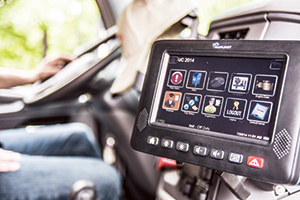Managing Editor, Features and Multimedia
ELDs: A New Era in Trucking
The Dec. 18 implementation date for the federal electronic logging device mandate will mark the beginning of a new era in trucking. Electronic logs are nothing new, of course — many fleets have been using them voluntarily for years or even decades. But moving nearly the entire longhaul trucking business onto ELDs will enhance adherence to driver hours-of-service limits across the industry and put all carriers on equal footing.

Seth Clevenger, Managing Editor, Features
The mandate will level the playing field among truck operators by eliminating the ability to falsify or “fudge” paper logs when a trip exceeds a driver’s available hours. Any carriers that have made a habit of skirting HOS regulations will be forced to change their business models. If they don’t, they may not be in the trucking business much longer.
Meanwhile, fleets that already use e-logs stand to benefit from the mandate. They could inherit business from competitors that don’t prepare properly for ELDs or perhaps exit the industry altogether rather than install the devices. At the same time, shippers, insurance firms and equipment financing providers likely will want to ensure that they’re working with carriers that are ELD-compliant.
LIVEONWEB: Watch 'The ELD Landscape Ahead,' Aug. 23, noon EDT
Beyond that, the ELD rule will have broader ramifications across the supply chain. At least in the short term, the mandate will reduce freight hauling capacity to some extent as HOS enforcement tightens (see story, next page).
Again, that will be a boon for carriers that are ELD ready but could make it difficult for some shippers to find enough trucks to move their freight.
Even with the deadline now less than four months away, many drivers and small carriers continue to wait rather than install ELDs in their trucks.
The Federal Motor Carrier Safety Administration’s ELD rule has withstood court challenges, but it seems that some who have opposed the mandate still may be holding out hope that the rule might be delayed or reversed — a scenario that appears highly unlikely.

The trucking industry's move to electronic logs will improve compliance with driver hours-of-service rules.
Rep. Brian Babin (R-Texas) introduced legislation in the House of Representatives that would delay the ELD mandate for two years, but that measure lacks the needed support from congressional leadership. All signs still point to a Dec. 18 implementation deadline for ELDs.
Putting all of that aside, first-time adopters of e-logs don’t have to view the mandate as a burden. It also can be an opportunity to improve planning and gain efficiency.
Many of the systems that offer ELD functionality also can provide a variety of other helpful applications, such as automating driver vehicle inspection reports and tracking fuel mileage and driver performance.
And even basic ELD products will relieve drivers of the need to manually fill out their paper logs, which actually could save them time.
But that’s not to say there won’t be challenges.
The influx of new technology vendors introducing their own ELD products ahead of the mandate will give carriers a broad variety of options to comply with the mandate but also may open the door for trouble down the line.
FMCSA is relying on vendors to self-certify their ELD products, which means there’s a danger that some devices might later be deemed noncompliant if challenged. And some of the many new vendors might not succeed, potentially leaving their carrier customers without support when devices malfunction. Given those potential pitfalls, carriers should be sure to select an ELD supplier that they trust.
If too many trucking companies wait until the final weeks or days to purchase ELDs, they also might encounter supply shortages as demand spikes ahead of the implementation date.
It also will take some time for enforcement officers to get up to speed on the many different types of ELDs they may encounter during roadside inspections.
Despite the likelihood of some initial hardships, ELDs ultimately will represent a significant step forward for the trucking industry.
Trucking in the ELD era will be safer, fairer and more efficient.




